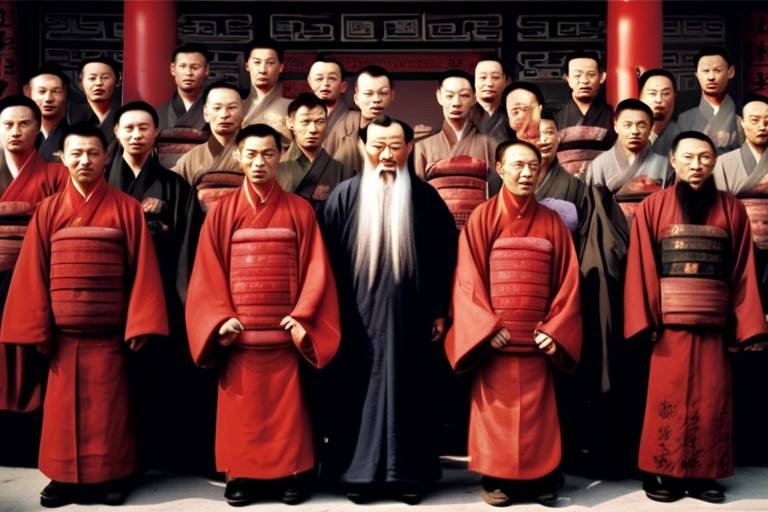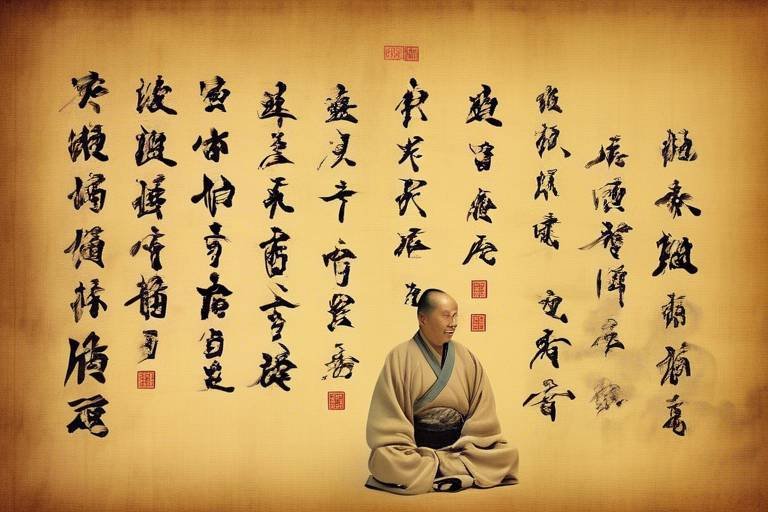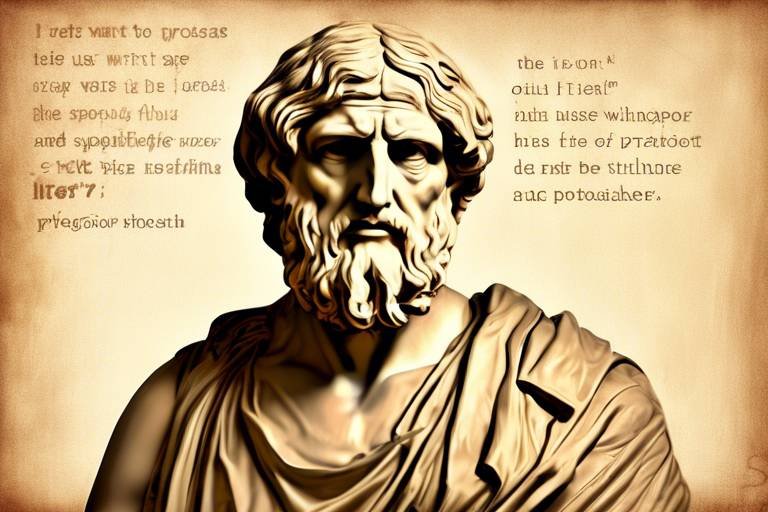Lucius Annaeus Seneca on Stoicism and the Art of Living
In a world that often feels chaotic and overwhelming, the teachings of Lucius Annaeus Seneca resonate with a profound clarity that can guide us towards a more fulfilling and meaningful existence. As one of the most prominent figures of Stoicism, Seneca's insights delve deep into the human experience, offering timeless wisdom on how to navigate life's challenges with grace and resilience. This article explores his teachings, shedding light on how they can serve as a compass in our journey towards personal growth and emotional well-being.
Seneca believed that life is not merely about enduring hardships but rather about mastering the art of living. His philosophy encourages us to embrace our emotions while also exercising control over them. Imagine standing on the edge of a turbulent sea; the waves may crash and roar, but it is your ability to steer the ship that determines whether you will weather the storm or succumb to its fury. This metaphor captures the essence of Seneca's teachings: we may not control the external world, but we can certainly control our responses to it.
At the heart of Seneca's philosophy is the idea that self-reflection and reason are essential tools for achieving tranquility. He posited that by engaging in practices such as reflective journaling and meditation, we can cultivate a clearer understanding of our emotions and actions. These exercises not only help us process our feelings but also empower us to make wiser decisions, ultimately leading to a more harmonious life.
Moreover, Seneca's life experiences as a statesman and philosopher shaped his views on ethics and morality. He faced numerous challenges, from political intrigue to personal loss, yet he emerged with a profound understanding of what it means to live virtuously. His writings encourage us to align our actions with our core values, emphasizing that true fulfillment comes from living a life of integrity, wisdom, and courage.
In essence, Seneca's teachings invite us to reflect on our own lives and consider how we can apply Stoic principles to enhance our emotional resilience. By recognizing the importance of reason, embracing our emotions, and accepting what we cannot control, we can cultivate a sense of peace amidst the chaos. As we explore the depths of Seneca's philosophy, we are reminded that the art of living is not just about surviving; it is about thriving, even in the face of adversity.
- What is Stoicism? Stoicism is an ancient philosophy that emphasizes self-control, rationality, and virtue as a means to achieve a fulfilling life.
- How can Seneca's teachings help in daily life? Seneca's insights provide practical strategies for managing emotions, making wise decisions, and living in accordance with one’s values.
- What is the significance of accepting fate in Stoicism? Accepting fate allows individuals to focus on what they can control, leading to greater emotional resilience and inner peace.

Understanding Stoicism
Stoicism is more than just a philosophical doctrine; it’s a way of life that has stood the test of time. Originating in ancient Greece, this philosophy teaches individuals the art of self-control and fortitude as essential tools for overcoming destructive emotions. Imagine facing life’s challenges with a calm mind and a steady heart—this is the essence of Stoicism. It’s about developing an inner fortress that shields you from the chaos outside.
At its core, Stoicism emphasizes the importance of rational thought. Think of your mind as a ship navigating through turbulent seas. Without a strong captain—your reason—this ship is bound to capsize in the storm of emotions and external pressures. Seneca, one of the most prominent Stoic philosophers, believed that by honing our reasoning skills, we can achieve a state of tranquility that allows us to navigate life's ups and downs with grace.
But what exactly does it mean to practice Stoicism in our daily lives? Here are a few key principles that Seneca and other Stoics advocate:
- Self-Reflection: Taking time to reflect on your thoughts and actions helps you understand your emotional responses.
- Acceptance: Embracing the things you cannot change frees you from unnecessary suffering.
- Mindfulness: Being present in the moment allows you to appreciate life as it unfolds.
By integrating these principles into our daily routines, we can cultivate a mindset that prioritizes emotional resilience and rational decision-making. Imagine walking into a stressful situation, feeling the tension in the air, yet remaining calm and collected. This is the power of Stoicism—transforming chaos into clarity.
Furthermore, Seneca’s teachings encourage us to view challenges as opportunities for growth. When faced with adversity, instead of succumbing to despair, we can ask ourselves, “What can I learn from this?” This shift in perspective not only empowers us but also aligns with the Stoic belief that our reactions to events are within our control, even if the events themselves are not.
In summary, understanding Stoicism is about recognizing the interplay between our thoughts, emotions, and actions. It’s a call to arms for anyone seeking a more fulfilling and meaningful life. By embracing reason, practicing self-reflection, and accepting the things we cannot change, we can navigate the stormy seas of life with confidence and resilience.

Seneca's Life and Influence
Lucius Annaeus Seneca, often simply known as Seneca, was a man of many talents and roles. Born around 4 BCE in Corduba (modern-day Córdoba, Spain), he eventually made his way to Rome, where he became a prominent statesman, dramatist, and philosopher. His life was not just a series of events; it was a tapestry woven with threads of political intrigue, personal tragedy, and profound philosophical exploration. Seneca's experiences as an advisor to Emperor Nero and his subsequent forced suicide in 65 CE provide a dramatic backdrop to his teachings on Stoicism, which continue to resonate today.
Seneca's position in the Roman Empire allowed him to observe the complexities of human nature and the often tumultuous relationship between power and morality. He witnessed firsthand the excesses of wealth and the fragility of fortune, which deeply influenced his philosophical outlook. In his writings, he often reflects on the dichotomy of public life versus private virtue, urging individuals to cultivate their inner selves amidst the chaos of external circumstances. His letters, particularly the famous "Letters to Lucilius," serve as a window into his thoughts and advice on how to navigate life's challenges with grace and integrity.
One of the key aspects of Seneca's influence lies in his ability to bridge the gap between theory and practice. He didn't just preach Stoicism; he lived it. His teachings emphasize the importance of self-reflection and personal responsibility. For instance, he believed that true wisdom comes from understanding oneself and recognizing the limits of one's control. By encouraging individuals to focus on their reactions to events rather than the events themselves, Seneca provides a practical framework for achieving emotional resilience.
Moreover, Seneca's influence extends beyond philosophy into the realms of literature and drama. His tragic plays, such as "Phaedra" and "Thyestes," explore themes of passion, revenge, and the human condition, showcasing his profound understanding of psychological depth and moral dilemmas. This literary prowess not only enriched Roman culture but also laid the groundwork for future playwrights and philosophers. His ability to articulate complex emotions and ethical conflicts resonates with audiences even today, proving that the struggles of humanity are timeless.
Seneca's teachings on ethics and morality are deeply intertwined with his life experiences. He often emphasized the virtues of wisdom, courage, and justice, encouraging individuals to align their actions with their moral values. This alignment is crucial for leading a harmonious life, according to Seneca. He believed that a life of virtue is the path to true happiness, and he urged his readers to strive for excellence in character and conduct.
In summary, Seneca's life and influence are a testament to the power of philosophy as a guiding force in life's journey. His experiences, both personal and political, shaped his Stoic teachings, making them not only relevant but also practical for anyone seeking a fulfilling and meaningful existence. As we delve deeper into his philosophies, we uncover timeless wisdom that encourages us to confront our challenges with reason, embrace our fate, and live in accordance with nature.
- Who was Seneca? Seneca was a Roman philosopher, statesman, and playwright known for his contributions to Stoicism.
- What is Stoicism? Stoicism is an ancient philosophy that teaches the development of self-control and fortitude to overcome destructive emotions.
- How did Seneca influence modern philosophy? Seneca's teachings on ethics, morality, and emotional resilience continue to inspire modern thinkers and individuals seeking a balanced life.
- What are some of Seneca's famous works? Some of his notable works include "Letters to Lucilius," "On the Shortness of Life," and various tragic plays.

The Role of Reason in Stoicism
When we dive into the heart of Stoicism, we quickly discover that reason is the bedrock of this ancient philosophy. Think of reason as the compass guiding us through the stormy seas of life. Seneca, one of the most influential Stoic philosophers, believed that our ability to think rationally is not just a skill but a vital tool for achieving tranquility and emotional stability. In a world filled with chaos and unpredictability, cultivating a strong sense of reason allows us to navigate challenges with grace.
Seneca argued that our emotions often cloud our judgment, leading us to make impulsive decisions that we might later regret. He famously stated, “We suffer more often in imagination than in reality.” This highlights the importance of stepping back and applying reason to our thoughts before reacting. By doing so, we can transform our emotional responses into more measured and thoughtful actions. It's like being a skilled captain steering a ship; without a clear course, we risk being tossed about by the waves of our feelings.
To harness the power of reason, Seneca recommended several practical exercises. These exercises serve as mental workouts, helping us build our reasoning muscles. For instance, he suggested reflective journaling as a way to process our thoughts and emotions. By writing down our feelings and analyzing them, we can gain clarity and insight into our reactions. This practice not only helps in understanding ourselves better but also in recognizing patterns that may lead to emotional turmoil.
Another technique Seneca advocated was meditation. This isn’t just about sitting in silence; it's about engaging in deep, reflective thought. By taking time to meditate on our experiences, we can cultivate a more rational perspective on our lives. Imagine sitting quietly, allowing your mind to settle like sediment in a glass of water—eventually, the clarity emerges, revealing the underlying truths of your emotional landscape.
Additionally, Seneca emphasized the importance of self-examination. He believed that regularly assessing our thoughts and behaviors is crucial for personal growth. This process involves asking ourselves tough questions: Are my reactions justified? Am I allowing external circumstances to dictate my happiness? By confronting these questions head-on, we can align our actions with our core values and make wiser choices.
In summary, the role of reason in Stoicism is paramount. It empowers us to rise above our emotions and approach life’s challenges with a calm and collected mindset. By practicing reflective journaling, meditation, and self-examination, we can sharpen our reasoning skills and lead a more fulfilling life. So, the next time you find yourself overwhelmed, take a step back, breathe, and let reason guide your way.
- What is the main idea of Stoicism?
Stoicism teaches the development of self-control and fortitude to overcome destructive emotions and lead a fulfilling life. - How can I apply Seneca's teachings in my daily life?
You can apply his teachings by practicing reflective journaling, meditation, and self-examination to enhance your reasoning abilities. - Why is reason so important in Stoicism?
Reason is essential in Stoicism as it helps us manage our emotions, make wise decisions, and achieve tranquility. - What exercises can help improve my reasoning skills?
Exercises like reflective journaling and meditation can significantly enhance your reasoning skills and emotional clarity.

Emotional Resilience
When we think about emotional resilience, we often picture a sturdy tree standing tall against the fiercest of storms. Seneca believed that just like that tree, we too can develop the strength to withstand life's challenges. Emotional resilience isn't merely about bouncing back from adversity; it's about cultivating the ability to navigate through life's ups and downs with grace and composure. Seneca's teachings provide us with invaluable insights into how we can foster this resilience in our own lives.
One of the core ideas Seneca emphasized was the importance of self-awareness. By understanding our emotions, we can better manage them. It's like having a map that guides us through the rocky terrain of our feelings. When we know what triggers our emotional responses, we can prepare ourselves and respond rather than react impulsively. This self-awareness is not a one-time achievement but a continuous journey of reflection and growth.
To build emotional resilience, Seneca suggested several practical strategies that we can incorporate into our daily routines. For instance, he often advocated for the practice of reflective journaling. This exercise allows us to put our thoughts on paper, offering clarity and perspective. By writing down our feelings, we can analyze them from a distance, much like an artist stepping back to view their painting. This distance helps us see patterns in our emotional responses and recognize what truly matters.
Another vital aspect of Seneca's approach is the role of mindfulness. He believed that being present in the moment allows us to appreciate life as it unfolds, reducing anxiety about the future and regrets about the past. Mindfulness can be practiced through meditation, deep breathing, or even simple moments of pause throughout our day. When we take a moment to breathe deeply and center ourselves, we can approach our challenges with a clearer mind and a steadier heart.
Moreover, Seneca highlighted the significance of community in building resilience. Surrounding ourselves with supportive friends and family creates a network of strength. When we face difficulties, having someone to lean on can make all the difference. This sense of connection reminds us that we are not alone in our struggles, and it can provide comfort and encouragement when we need it most.
In summary, emotional resilience is an essential skill that we can nurture through self-awareness, reflective practices, mindfulness, and community support. By embracing these principles, as taught by Seneca, we can cultivate a robust emotional foundation that enables us to weather life's storms. Remember, just like the tree that bends but does not break, we too can learn to adapt and thrive in the face of adversity.
- What is emotional resilience?
Emotional resilience refers to the ability to adapt and recover from stress, adversity, and challenges. It involves managing emotions effectively and maintaining a positive outlook despite difficulties. - How can I develop emotional resilience?
You can develop emotional resilience by practicing self-awareness, engaging in reflective journaling, practicing mindfulness, and building a supportive community around you. - Why is emotional resilience important?
Emotional resilience is important because it helps individuals cope with stress and adversity, leading to better mental health, improved relationships, and a more fulfilling life.

Practical Exercises for Reasoning
When it comes to developing our reasoning skills, Seneca's teachings offer a treasure trove of practical exercises. These aren't just abstract ideas; they are actionable steps that anyone can incorporate into their daily routine. One of the most effective methods he advocated is reflective journaling. This practice involves taking time each day to jot down your thoughts, feelings, and reactions to events. By doing so, you can gain clarity about your emotional responses and identify patterns that may not be immediately obvious. Imagine your mind as a cluttered room; journaling is like opening the windows and letting in fresh air, allowing you to see things more clearly.
Another powerful exercise is meditation. Seneca believed that quieting the mind allows us to access our rational thoughts more easily. Just a few minutes of meditation can help you detach from overwhelming emotions and see situations for what they truly are. Think of it as a mental reset button, giving you the space to respond thoughtfully instead of reacting impulsively. You might be surprised at how this simple practice can change your perspective on daily challenges.
In addition to journaling and meditation, Seneca encouraged individuals to engage in philosophical discussions. Talking about philosophical concepts with friends or family can deepen your understanding and challenge your reasoning. This dialogue can be a catalyst for personal growth, as it forces you to articulate your thoughts and defend your beliefs. Consider it a friendly sparring match for your mind, where every exchange sharpens your reasoning skills further.
To help you get started, here’s a brief overview of these exercises:
| Exercise | Description | Benefits |
|---|---|---|
| Reflective Journaling | Writing down thoughts and feelings daily. | Enhances self-awareness and emotional clarity. |
| Meditation | Quieting the mind to access rational thought. | Reduces stress and improves focus. |
| Philosophical Discussions | Engaging in conversations about philosophical ideas. | Strengthens reasoning and critical thinking skills. |
By incorporating these exercises into your life, you can cultivate a more rational mindset. Remember, the goal isn't perfection but rather progress. Each small step you take toward enhancing your reasoning abilities can lead to profound changes in how you navigate life's challenges. So, why not start today? Grab a journal, find a quiet spot for meditation, or reach out to a friend for a stimulating discussion. Your journey toward a more reasoned and fulfilling life is just beginning!
- What is reflective journaling? Reflective journaling is the practice of writing down your thoughts and feelings, helping you gain clarity and self-awareness.
- How long should I meditate each day? Even a few minutes can be beneficial! Start with 5-10 minutes and gradually increase as you become more comfortable.
- Can I practice these exercises alone? Yes! While discussions can enhance learning, both journaling and meditation can be effectively practiced solo.
- How do these exercises improve my reasoning? They help you process emotions, clarify thoughts, and engage critically with ideas, leading to better decision-making.

Ethics and Morality in Seneca's Philosophy
When we dive into the world of Seneca, we quickly discover that ethics and morality are not just abstract concepts for him; they are the very fabric of a meaningful life. Seneca believed that our moral compass should guide our actions, and he placed a heavy emphasis on virtues such as wisdom, courage, and justice. These virtues are not merely ideals to strive for; they are practical tools that help us navigate the complexities of life. Imagine trying to sail a ship without knowing how to read the stars; that’s what life is like without a strong ethical foundation.
Seneca’s writings encourage us to align our actions with our moral values. He argued that true happiness is not found in external possessions or fleeting pleasures but in the integrity of one’s character. To illustrate this point, consider the following table that highlights key virtues in Seneca's philosophy:
| Virtue | Description |
|---|---|
| Wisdom | The ability to discern what is truly important in life. |
| Courage | The strength to face adversity and stand up for one’s beliefs. |
| Justice | The commitment to fairness and the well-being of others. |
In his letters, Seneca often reflected on the importance of self-examination. He believed that regularly assessing our actions against our ethical standards is crucial for personal growth. This practice is akin to holding a mirror to our soul, allowing us to see where we may have strayed from our moral path. By doing so, we can recalibrate our actions and intentions, ensuring they align with our core values.
Seneca also recognized that ethical living is not a solitary endeavor. He emphasized the significance of community and relationships in shaping our moral landscape. Engaging with others provides us with opportunities to practice virtues and reinforces our commitment to ethical behavior. He famously stated, “One man’s good is another man’s evil,” highlighting the complexity of moral choices in a social context. Thus, we must be mindful of how our actions affect those around us.
Ultimately, Seneca's philosophy invites us to consider the broader implications of our choices. By embracing virtues and aligning our actions with our moral values, we not only enhance our own lives but also contribute positively to the lives of others. This interconnectedness fosters a sense of community and shared purpose, which is essential for a fulfilling existence.
- What are the main virtues in Seneca's philosophy? Seneca emphasized wisdom, courage, and justice as key virtues that guide ethical living.
- How does Seneca suggest we practice self-examination? He recommends regular reflection on our actions and their alignment with our moral values.
- Why is community important in Seneca's ethical framework? Engaging with others helps us practice virtues and understand the impact of our actions on those around us.

Acceptance of Fate
When we dive into the teachings of Seneca, one of the most compelling themes that emerges is the concept of . Life is unpredictable, and let's be honest, it can throw us some serious curveballs. But instead of wrestling with the uncontrollable, Seneca urges us to embrace the notion that some things are simply beyond our reach. Imagine trying to hold onto water with your bare hands; the more you grasp, the more it slips away. This metaphor perfectly encapsulates the futility of resisting what we cannot change.
Seneca believed that by understanding and accepting what we cannot control, we can cultivate a sense of inner peace. This acceptance doesn't mean we become passive or indifferent to life’s challenges. Rather, it empowers us to focus our energy on what truly matters—our thoughts, actions, and responses. By adopting this mindset, we can navigate through life's storms with a sense of resilience and clarity.
To illustrate this principle, consider the following table that outlines key aspects of Seneca's philosophy on acceptance:
| Concept | Explanation |
|---|---|
| Understanding Fate | Recognizing that certain events are beyond our control. |
| Emotional Detachment | Learning to detach from outcomes we cannot influence. |
| Focus on Action | Concentrating on our own actions and responses. |
| Inner Peace | Achieving tranquility through acceptance of circumstances. |
This table serves as a reminder that acceptance is not a sign of weakness; it’s a powerful tool that enables us to reclaim our energy and focus on what we can change. Think about it—how often do we find ourselves worrying about things that are completely out of our hands? It’s a waste of mental and emotional resources. Instead, Seneca encourages us to practice what he calls the dichotomy of control. This means distinguishing between what we can influence and what we cannot.
In practical terms, this could look like:
- Accepting the outcomes of a job interview, while preparing thoroughly beforehand.
- Recognizing that while we can’t control the weather, we can choose how to react to it.
- Understanding that other people's opinions of us are out of our control, but our self-worth is determined by our own values.
By focusing on the things we can control, we not only reduce anxiety but also foster a more fulfilling life. Think of acceptance as the foundation of a house; without it, everything else can feel unstable. When we build our lives on the solid ground of acceptance, we create a space where we can thrive despite external pressures.
In conclusion, the acceptance of fate is a vital aspect of Seneca's teachings that encourages us to let go of the need to control everything around us. By embracing this philosophy, we can cultivate a more peaceful and resilient mindset, allowing us to navigate life’s challenges with grace and wisdom.
1. What does Seneca mean by acceptance of fate?
Seneca's acceptance of fate refers to the understanding that certain aspects of life are beyond our control, and by accepting this, we can achieve inner peace.
2. How can I practice acceptance in my daily life?
You can practice acceptance by focusing on your reactions to events rather than the events themselves, and by identifying what is within your control.
3. Is acceptance the same as giving up?
No, acceptance is not about giving up; it’s about recognizing what you cannot change and redirecting your energy towards what you can influence.
4. Can acceptance help reduce anxiety?
Absolutely! By accepting what you cannot change, you free yourself from unnecessary worry and anxiety, allowing you to focus on more constructive thoughts and actions.

The Dichotomy of Control
One of the most profound teachings of Seneca revolves around the dichotomy of control. This concept is about understanding the difference between what we can control and what we cannot. Imagine standing at the edge of a vast ocean, watching the waves crash against the shore. You can’t control the tides, the wind, or the weather, but you can control how you respond to it. This analogy perfectly encapsulates Seneca's belief that our peace of mind hinges on this very understanding.
In life, we often find ourselves consumed by worries over things that are entirely out of our hands—be it the opinions of others, unexpected events, or even the passage of time. Seneca urges us to shift our focus away from these uncontrollable aspects and instead concentrate on our own actions and reactions. This is not merely a philosophical exercise; it’s a practical guide to living a more serene life. By acknowledging what lies beyond our control, we free ourselves from unnecessary anxiety and stress.
To illustrate the dichotomy of control, let’s break it down into two categories:
- What we can control: Our thoughts, intentions, choices, and reactions.
- What we cannot control: Other people's actions, external events, and the past.
By focusing on the former, we empower ourselves to take charge of our lives. Seneca believed that when we align our efforts with what we can influence, we cultivate a sense of agency that leads to greater tranquility. For example, if you’re facing a challenging situation at work, instead of fretting over your boss's decisions or the company’s direction, concentrate on how you can improve your own performance and adapt to changes. This shift in mindset can transform feelings of helplessness into proactive engagement.
Moreover, recognizing the dichotomy of control fosters emotional resilience. When we accept that certain outcomes are beyond our influence, we become less reactive to disappointments and setbacks. This doesn’t mean we stop caring; rather, we learn to let go of the need to control every aspect of our lives. It’s about finding peace in the acceptance of life’s unpredictability.
In conclusion, embracing the dichotomy of control is a powerful tool in our quest for a fulfilling life. By focusing on what we can change and accepting what we cannot, we pave the way for a more balanced and harmonious existence. It’s a lesson that remains relevant today, urging us to cultivate a mindset that prioritizes our inner peace over external chaos.
- What is the dichotomy of control? It is the principle that distinguishes between what we can control (our thoughts and actions) and what we cannot control (external events and other people's actions).
- How can I apply this concept in my daily life? Focus on your responses to situations rather than trying to control the situations themselves. This can reduce stress and increase your sense of agency.
- Why is this concept important? Understanding the dichotomy of control helps in reducing anxiety and promotes emotional resilience, allowing for a more peaceful and fulfilling life.

Living in Accordance with Nature
Living in accordance with nature is a profound concept that Seneca passionately advocated. He believed that understanding our relationship with the universe is crucial for achieving a balanced and fulfilling life. Imagine standing by a river, watching the water flow effortlessly around rocks and bends. This is how life should be approached—fluid, adaptable, and in harmony with the environment around us. Just as the river finds its path, we too must learn to navigate the challenges of life while remaining true to our nature.
Seneca taught that by aligning our actions with the natural order, we can cultivate a sense of peace and purpose. This means embracing our human nature, acknowledging our strengths and weaknesses, and recognizing our place within the larger tapestry of existence. To live in accordance with nature is to accept the cycles of life, including joy and suffering, and to understand that both are essential for growth.
Moreover, Seneca emphasized the importance of simplicity and moderation. In a world that often pushes us towards excess and distraction, returning to nature can be a grounding experience. He suggested that we should strive to live simply, appreciating the beauty in everyday moments. This could mean taking a walk in the park, enjoying a quiet evening under the stars, or even just savoring a cup of tea in silence. By doing so, we reconnect with our true selves and the world around us.
To further illustrate this concept, consider the following table that outlines the key principles of living in accordance with nature according to Seneca:
| Principle | Description |
|---|---|
| Acceptance | Embrace life’s inevitable changes and challenges. |
| Moderation | Seek balance in all aspects of life, avoiding extremes. |
| Simplicity | Find joy in the simple pleasures and experiences of life. |
| Reflection | Regularly contemplate your actions and their alignment with nature. |
Incorporating these principles into our daily lives can lead us to a more profound sense of fulfillment. Just as trees grow towards the sun, we should strive to grow towards our highest potential by nurturing our innate qualities and virtues. This journey towards living in accordance with nature is not just a philosophical exercise; it is a practical guide to leading a meaningful life.
Ultimately, Seneca’s teachings remind us that we are all part of a larger whole. By recognizing our connection to the universe and embracing our role within it, we can cultivate a sense of belonging and purpose. So, the next time you feel overwhelmed by life’s chaos, take a moment to breathe, reconnect with nature, and realign yourself with the principles that Seneca so passionately espoused.
- What does it mean to live in accordance with nature? Living in accordance with nature means aligning your actions and thoughts with the natural order of the universe, embracing both the joys and challenges of life.
- How can I incorporate Seneca's teachings into my daily life? You can incorporate his teachings by practicing acceptance, moderation, simplicity, and reflection in your daily routines.
- Why is emotional resilience important in Stoicism? Emotional resilience helps individuals manage their emotions effectively, allowing them to maintain composure during difficult times and make rational decisions.
Frequently Asked Questions
- What is Stoicism?
Stoicism is an ancient philosophy that emphasizes the development of self-control and fortitude to overcome destructive emotions. It teaches individuals how to maintain a sense of tranquility and rationality in the face of life's challenges.
- Who was Seneca?
Lucius Annaeus Seneca was a Roman statesman, philosopher, and playwright. His life experiences as a public figure and his philosophical insights offer a unique perspective on applying Stoic principles to both personal and public life.
- How does Seneca define emotional resilience?
Seneca believed that emotional resilience involves developing the ability to manage one’s emotions effectively. He provided strategies for maintaining composure and rationality, even during difficult times, ensuring that individuals can navigate life's ups and downs with grace.
- What practical exercises does Seneca recommend for cultivating reason?
Seneca suggested several exercises, such as reflective journaling and meditation, to help individuals gain clarity on their emotions and actions. These practices encourage self-reflection and promote a more reasoned approach to decision-making.
- What is the significance of the dichotomy of control in Stoicism?
The dichotomy of control is a crucial concept in Stoicism that helps individuals differentiate between what they can control and what they cannot. By focusing on their own actions and responses, people can reduce anxiety and channel their efforts more effectively.
- How does Seneca suggest we deal with fate?
Seneca teaches that acceptance of fate is essential for achieving inner peace. By understanding and accepting what is beyond our control, we can cultivate resilience and navigate life's challenges with a balanced mindset.
- What role does ethics play in Seneca's philosophy?
Ethics is at the heart of Seneca's Stoicism. He emphasized virtues such as wisdom, courage, and justice, encouraging individuals to align their actions with their moral values to lead a harmonious and fulfilling life.
- How can living in accordance with nature improve our lives?
Living in harmony with nature, as advocated by Seneca, allows individuals to understand their place in the universe. This understanding fosters a balanced approach to life, leading to greater fulfillment and a sense of purpose.


















